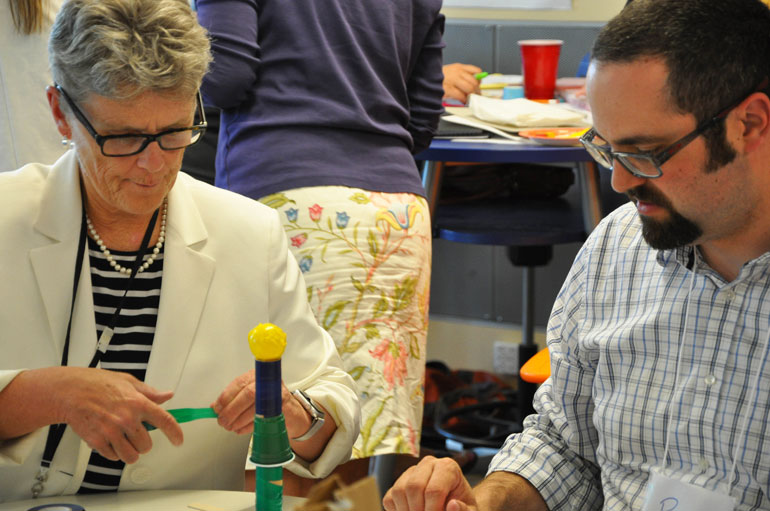
Jan Unwin (left), Superintendent of Graduation and Student Transitions with the Ministry of Education and the Ministry of Advanced Education, participates in a maker demonstration at UBC’s Small Schools Think Tank this week.
UBC Okanagan is working with rural educators from across the province to find ways to help schools in smaller communities.
Recently, UBC Okanagan’s Faculty of Education hosted the Small School Think Tank (SSTT), a two-day event held May 16 and 17. At the event, educators come together to find a way forward for rural community schools.
“When we look at what rural and small secondary schools offer the province, we see examples of innovation, creativity, and community partnership,” says Leyton Schnellert, co-chair of the BC Rural Education Advisory Committee and assistant professor of education at UBC’s Okanagan campus. “Events like the SSTT hold the potential to affirm and strengthen powerful local practices and structures and inspire schools in BC to generate their own creative solutions.”
The third annual SSTT, hosted by the Faculty of Education, offered educators from around the province an opportunity to collaborate and envision a successful future for rural schools.
Educators from 15 BC school districts participated in an empathetic design process to support a small rural case study school.
“The SSTT epitomizes the agenda of the new K to 12 curriculum,” says Jan Unwin, Superintendent of Graduation and Student Transitions with the Ministry of Education and the Ministry of Advanced Education. “Rural schools exemplify good teaching because teachers are able to form close bonds with students. Engagement is something that we would like to highlight in the new curriculum.”
This year’s case focused on Desert Sands Community School (DSCS) in Ashcroft, BC. School District 74 (Gold Trail) merged Ashcroft’s elementary and secondary schools to create DSCS a K-12 school with a combined student enrolment of 265 students.
Rural educators responded to the case discussing ways to keep community schools vital and alive, while also finding ways to support interdisciplinary and inquiry learning with the introduction of the new provincial K to 12 curriculum.
Pat Dooley, co-chair of the BC Rural Education Advisory Committee, sees the value in collaboration.
“The SSTT is an example of what the Rural Education Advisory Committee has conceptualized as ‘the rural commons.’ We have created space for teams to work and learn from each other while considering changes in the curricular and other educational directions presented by the ministry.”
Solutions emerging from the Think Tank include inviting community members into the schools to see the new ways of learning, while supporting students’ unique interests in grades 10, 11, and 12, so they continue to be interested in their education.
“Part of our work is to help parents understand that their kids are receiving a great education in our small interdisciplinary program,” says Colleen Minnabarriet, principal of Desert Sands Community School. “Being part of the SSTT is a huge help because of the thoughtful input of others, and the credibility of UBC as an institute of higher learning.”
Since 2002, there have been more than 250 school closures in British Columbia, many of them in rural areas.
— 30 —